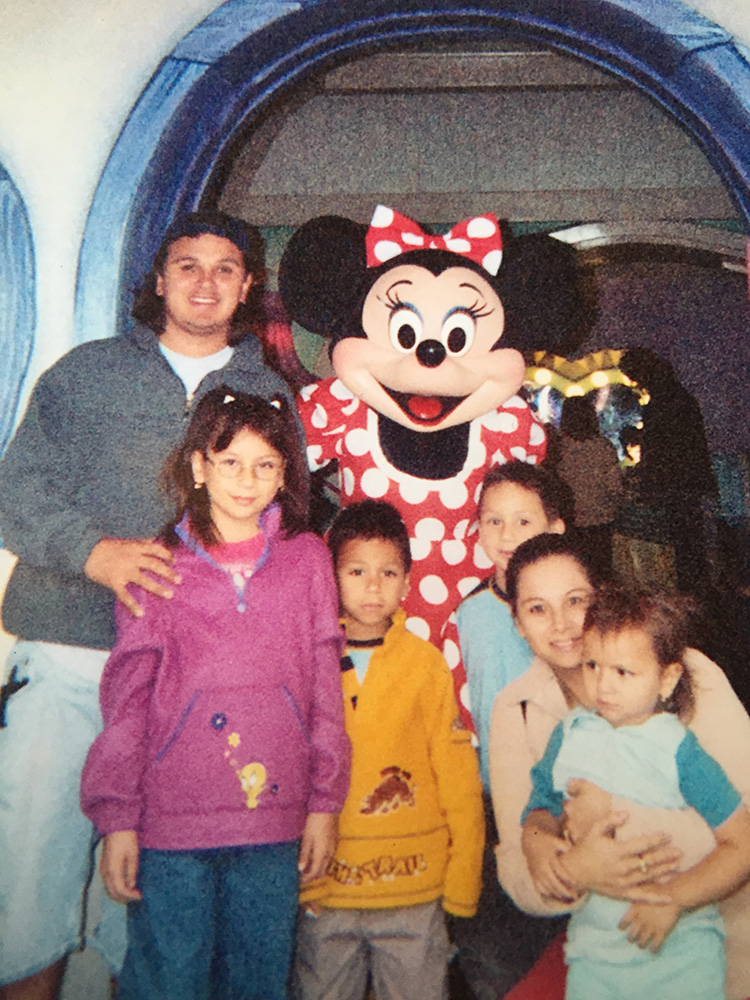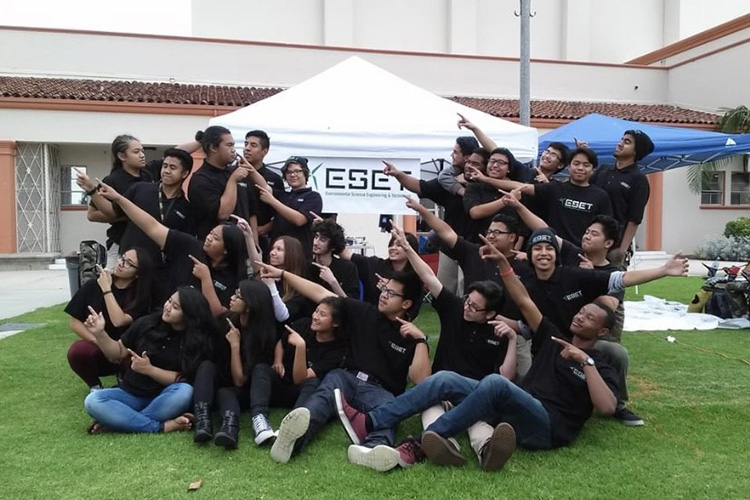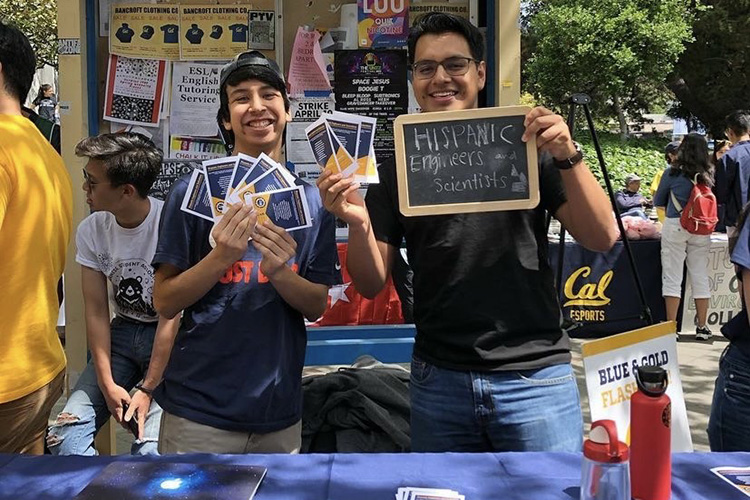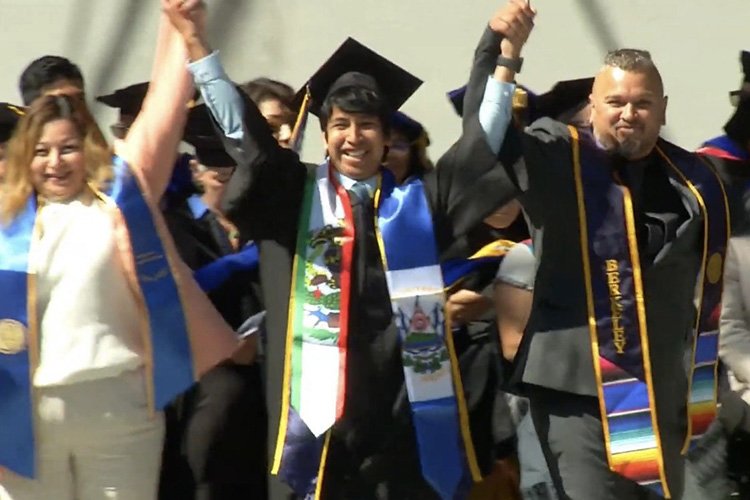UC Berkeley graduate Alberto Ibarra: ‘Succeed through the thorns’
La Loma Rooftop Garden founder reflects on his family, and the campus community, that helped him to overcome barriers to achieve his degree.
May 17, 2022

UC Berkeley STEM graduate Alberto Ibarra reflects on how his family, and the campus community, helped him to overcome barriers to achieve his Berkeley degree. (Photo courtesy of Alberto Ibarra)
This I’m A Berkeleyan feature was written as a first-person narrative from an interview with Alberto Ibarra. At the request of Ibarra, a Spanish translation of this story can be found here. Have someone you think we should write about? Contact [email protected].
When I was a kid, I remember watching my mom water her garden. She put a lot of time and effort into her small, budding rose bushes, treating them with love and rich soil.
And every spring, they would bloom with big, vibrant colored petals in front of our two-bedroom apartment. People would walk by and admire them because they stood out amidst the pavement and untreated potholes of our urban neighborhood.
Looking back now, those roses were a reminder to me that despite the environment or space that we live in, there is beauty and warmth all around us. Beauty that we can create for others to see.

Ibarra’s family together on campus for the first time during his UC Berkeley’s Summer Bridge program in 2015. (Photo courtesy of Alberto Ibarra)
As a recent UC Berkeley graduate and first-generation student from underrepresented communities, I know that it can feel like Berkeley is a place that some of us don’t belong. Like a vast institution with unfamiliar spaces that can be hard to navigate.
Which is why I wanted to share my story. To help other students from similar backgrounds understand that although other students may have had the preparation and resources throughout their lives that you didn’t, succeeding through the thorns of life is possible.
It was, and is, for me.
I was born in Inglewood, California. My mother came to America from El Salvador, and my father from Mexico. They met growing up in Inglewood and were high school sweethearts. However, in Inglewood, our upbringings were riddled with gangs, lack of opportunities and financial inequalities.
They started a family at a very young age and instilled in my siblings and I the importance of hard work. Regardless of what you were doing — school, sports or any other activities — you always had to work hard, no matter what.
And it wasn’t just talk. We actually observed our parents do this. Both my father and mother cleaned different buildings around the area at night. My siblings and I would play in the halls of the schools and businesses they cleaned, and we sometimes helped. As time progressed, my father would work in construction all day, and my mother would work late night shifts at the airport.

Childhood photo of Ibarra’s family at Disneyland. From left to right: father, older sister Kelly, twin brother Carlos, mother, and younger sister Karla. (Photo courtesy of Alberto Ibarra)
No matter how tired they were from working, my parents always took the time to encourage our interests and help us grow. As huge soccer fanatics, my father would still manage to make time after a long day of work to take my twin brother and I out to the soccer field to practice. He would even find ways to coach our teams, even though his schedule was limited.
And while my mom didn’t speak English well, on her days off she took the time to read to us — in her Spanish accent — all the books we wanted. She instilled in us the importance of having a good education and would often take us to the local library just to read.
We lived humbly, but we always had a lot of love in our household.
We also struggled financially.
I remember hearing conversations about our finances and seeing copies of the bills that we owed laying on the kitchen table. I would add the balance together and begin to think of ways we could save money. I dove into the world of coupons, recycled cans for extra cash and helped to think of a budget to manage daily expenses.
When we moved to Carson, we still encountered gangs and violence. Police helicopters would fly above our streets in search of crime every day. And kids my age would use and sell drugs around my neighborhood.
To make sure we avoided that type of life, my parents were strict and never let us stay out too late. It felt like crime and drugs surrounded me, and at times I felt like I just had to block out the environment that I lived in to avoid damaging my future.
I just needed to allow myself to grow — to be myself, despite the hardships.
At school, I was so shy and quiet that my teachers thought that I had a speech/language impairment. After trying to place me in special education classes and realizing how well I performed in math and reading tests, their assumptions about me dropped.
Although their views on me changed, I think their lack of confidence in me made a lasting impression, where I grew to lack confidence in myself.
So, I would often keep to myself and read books that helped me escape, like the Harry Potter series and other fiction adventure novels. In high school, I started to bloom out of my shell a little more when I discovered engineering design, robotics and leadership/mentorship.
I knew I just wanted to think creatively about technology — and build innovative things to share with others.
But I knew, going to a public school in a low-income community, we didn’t have as many resources as other schools. During high school robotics competitions, I remember seeing all of the new and expensive materials other schools would use to build their robots, and we would be using recycled plastic and metals.

The Carson High School robotics team at a competition in 2014. Ibarra’s participation in the team was pivotal for growing his passion for engineering. (Photo courtesy of Alberto Ibarra)
But my high school robotics team would still be competitive with these high schools and surprisingly perform well every year, even with our limited resources. Our remarkable, innovative recycling efforts were even praised in our local newspaper.
That experience motivated me to want to become a socially responsible engineer. I knew how it felt not to have access to resources, so I wanted to go to college to solve problems for the common good. To provide resources for communities through engineering and technology.
But also, by achieving a higher education, I felt like I could help end my family’s financial struggles.
Getting into UC Berkeley occurred by happenstance. I would call it fate.
I had never researched, visited or heard much about Berkeley. Being such a family-oriented person, I wanted to stay close to home in Southern California. So, I applied to nearly all the universities and colleges near Los Angeles.

Ibarra was admitted to Berkeley and won the Regents and Chancellor’s Scholarship. (Photo courtesy of Alberto Ibarra)
The day I was going to turn in my college applications, I randomly ran into my high school science teacher, Mrs. Bird, during my school break as I was working on my college apps at the local Boys & Girls Club. She mentioned Berkeley during our conversation as a great school to apply to, and later that night, I decided to last-minute check the box to turn an application in to Berkeley.
I was contacted a few months later to schedule an interview for consideration of a Berkeley scholarship. Weeks after my interview, Berkeley released their admission decisions, and I received the Regents’ and Chancellor’s Scholarship Award: I was surprised and grateful.
I still didn’t want to go too far from home. But my parents really wanted me to go to the best school that I could, especially after explaining all the things that I learned from my college counselor, Mrs. Engel.
And that was Berkeley.
So, in the summer of 2015, I moved into an on-campus dorm to attend Berkeley’s Summer Bridge program and the Pre-Engineering Program (PREP), which helped me to make lifelong friends from similar backgrounds and take classes before the fall semester.
The program was helpful, but on campus I still felt nervous and sometimes alone as the fall semester began. It felt like I didn’t belong with other students that had much more experience and resources than I did. It didn’t help, either, when I was one of the few Latinos in my engineering classes.
I also had dealt with being racially profiled and/or prejudiced multiple times on campus.

Ibarra with his UC Berkeley Summer Bridge 2015 floor mates. (Photo courtesy of Alberto Ibarra)
On top of all of that, I was experiencing a lot of stress coping with disease in my family. I felt like I was thrown into uncharted waters and forced to learn how to swim.
Those first two or so years at Berkeley was like a rollercoaster of emotions for me. I was at times anxious, stressed and overwhelmed. It felt like a degree was a far-fetched accomplishment.
It was harder than anything I had ever experienced socially, academically and emotionally.
But something that always grounded me was my family and that foundation of love and persistence they gave me as a child. I had all of the traits to succeed, I just needed to allow myself to grow — to be myself, despite the hardships.

Ibarra and Jose Cortes tabling at Sproul Hall for Hispanic Engineers and Scientists (HES) student organization. (Photo courtesy of Alberto Ibarra)
So, I started to connect with more resources on campus, like Berkeley’s Educational Opportunity Program, Engineering Student Services, Cal Nerds and also the Disabled Students’ Program, which helped me to realize my learning needs. They provided academic advising and granted me accommodations to help me succeed in my courses.
This would ultimately help lessen my anxiety and stress, while embracing my difficulties.
Campus clubs and organizations, like my intramural soccer team, Hispanic Engineers and Scientists Organization and Hermanos Unidos, also supported my need to socialize and network with a like-minded community of students. I also found peers, graduate students, advisers and professors that genuinely took the initiative to get to know me and helped me to break out of my shell and to just be myself.
After finding my communities on campus, things really started to fall into place for me.
I actively sought to not only challenge myself with rigorous engineering coursework, but also establish my footing in research around my interested areas of design, manufacturing and innovation.

Ibarra in a campus lab researching microfluidic devices. (Photo courtesy of Alberto Ibarra)
With the guidance of Dorian Liepmann, my mechanical engineering professor, I began to design microfluidic medical devices in a lab setting as my first research experience.
My design and manufacturing pursuits at Berkeley led me to work in life-changing projects in both the BEST Lab and Squishy Robotics, with the support of my professor, Dr. Alice Agogino. I was able to take part in designing functional, fitted prosthetic hands for the purpose of physical activities of children, performing 3D modeling and modifying existing CAD prosthetic hands.
I even got the chance to present my work at the 25th Annual National McNair Scholars Symposium.
During my internship at Squishy Robotics, I also had the rewarding opportunity to work on sensor payload robots created to help first responders, such as firefighters. Essentially, these robots are air-deployed to these highly hazardous areas in order to detect chemicals and send info to first responders to help them make life-changing decisions for themselves, and for improving situational awareness.
Currently, we are designing a mechanism that will help these robots land safely, using technology similar to a badminton shuttlecock.
All of these fulfilling experiences have motivated me to continue my studies at Berkeley as part of the mechanical engineering graduate program, where I hope to continue to find ways to help people.

Ibarra at the La Loma Rooftop Garden he founded basking in an assortment of tall, vibrant sunflowers in spring 2021. (Photo courtesy of Alberto Ibarra)
Something I am most proud of from my time as an undergraduate at Berkeley is the La Loma Rooftop Garden, located at the Bechtel Terrace Engineering Center.
With the support of the Hispanic Engineers and Scientists organization, I helped spearhead, fundraise grants and collaborate with other campus gardens through the Berkeley Student Farms coalition.
Located on the engineering library rooftop, the garden gives Latinx and students of color who may have gone through similar challenges or have similar backgrounds a space of their own to practice self-care and self-love.

Ibarra and his parents walking on stage at last week’s Latinx Graduation ceremony. (Photo courtesy of Alberto Ibarra)
I find gardening to be a form of therapy. It’s relaxing and can be very meditative for people going through internal struggles. The garden also reminds me of my parents, especially my mom, who always spends so much time caring for her roses.
I relate a lot to that poem by Tupac Shakur, “The Rose That Grew From Concrete.” Regardless of the challenges and adversity I went through growing up in a disadvantaged environment, my family gave me the strength and foundation to persevere through that concrete.
I may have some scratches and scars , and I may not be the best-looking rose, but I’m still a rose looking up and reaching toward the sky.
With my family, my light.
Through my story, and my continuation in education, I hope to inspire anyone who is experiencing that darkness that I did. To let them know they can and will overcome those challenges.
To nurture more seedlings. For more roses to grow and to succeed through the thorns.